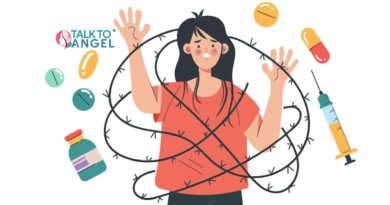What is Deaddiction Counselling? and How It Works
Deaddiction counselling, commonly known as addiction counselling or substance abuse counseling, is a form of psychotherapy designed to guide individuals through recovery from addiction. The goal of this counselling is to address the physical, psychological, and social aspects of the addiction, regardless of whether it involves substances like drugs and alcohol or behavioural compulsions like gambling or overeating. It helps clients explore underlying causes, develop coping strategies, and support sustained sobriety or abstinence.
Addiction often shadows mental health conditions—anxiety, depression, stress, personality disorders, post-traumatic stress disorder (PTSD), trauma, and social isolation are frequently comorbid and must be addressed in the recovery journey.
Why Deaddiction Counselling Matters
Addiction is not merely a physical dependency—it’s deeply rooted in behavior, emotion, and experience. Addiction Counselling tackles the mental, emotional, and environmental triggers often left unaddressed by detox alone. For instance, individuals early in recovery may struggle with denial, shame, or difficulty coping with stress; counsellors help create structure, safety, and psychological resilience, greatly reducing relapse risk .
Core Objectives of Deaddiction Counselling
- Exploring Root Causes – Help clients understand personal triggers—trauma, stress, underlying mental health conditions, or environmental and genetic predispositions.
- Building Coping Strategies – Develop healthy ways to manage stress, anxiety, cravings, and negative emotions.
- Strengthening Self‑Worth and Coping Mechanisms – Promote self-esteem, emotional regulation, and confidence to face life post-addiction.
- Preventing Relapse – Equip clients to recognize cues and triggers, and rehearse strategies to maintain standards of recovery.
- Repairing Relationships – Help rebuild trust and communication with loved ones, and support restoration of social networks.
How Deaddiction Counselling Works: Therapeutic Modalities
Behavioral Therapies
- Cognitive Behavioral Therapy (CBT) focuses on reframing maladaptive thought patterns and managing triggers. Research supports its effectiveness for substance use disorders.
- Dialectical Behavior Therapy (DBT) enhances emotional regulation, distress tolerance, and interpersonal effectiveness—useful for addictions and concurrent mental health challenges.
- Motivational Interviewing (MI) and Motivational Therapy (MT) foster readiness to change by empathetic engagement and facilitating client-driven motivation.
- Contingency Management uses rewards to reinforce abstinent behaviors and relapse prevention.
Psychosocial Approaches
- Twelve-Step Facilitation / 12-Step Programs (like Alcoholics Anonymous and Narcotics Anonymous), often supported through counselling, facilitate peer support and accountability; studies show effectiveness comparable to CBT and motivational strategies.
Holistic & Creative Therapies
- Approaches like Acceptance and Commitment Therapy (ACT), Art Therapy, and Family Therapy are also used to support a more comprehensive healing journey.
Formats of Addiction Counselling
- Individual Counselling – One-on-one therapy tailored to individual experiences and goals; deeply personal support.
- Group Counselling – Peer-based sessions fostering connection, empathy, shared learning, and accountability.
- Family Therapy – Engages family members to rebuild healthy dynamics, reduce relapse, and offer mutual support.
Integration into Treatment Programs
Deaddiction counselling is offered across various care models:
- Outpatient Programs – Offers flexibility with regular therapy while clients maintain daily routines.
- Intensive Outpatient (IOP) & Partial Hospitalization (PHP) – Structured therapy several times a week with high support but no residential stay.
- Residential Treatment – Short-term (3–6 weeks) or long-term (6–12 months) immersive programs with 24/7 support in a substance-free environment..
Addressing Co-Occurring Mental Health Conditions
Deaddiction counselling regularly intersects with other mental health challenges like depression, anxiety, stress, personality disorders, PTSD, and trauma. These comorbidities influence triggers and recovery success, making an integrated therapeutic approach essential.o
Online Addiction Counselling: Access and Benefits
Digital platforms enhance accessibility and flexibility. Patients can connect with qualified online psychologists, online counsellors, or receive online psychiatric consultations via chat or video—especially valuable for those facing stigma or logistical barriers. Services like TalktoAngel offer online counselling across behavioral and substance addictions, attuned to underlying issues like depression, anxiety, trauma, and personality disorders.
Deaddiction Counselling in Delhi: Services and Providers
In Delhi, options span online and in-person modalities.
- Best Psychologist in India, best psychiatrist in India, and clinics like Psychowellness Center recognised as the best mental health wellness clinic in Delhi, offer comprehensive care, including addiction counselling, deaddiction counselling in Delhi, and broader mental health support.
- Platforms like TalktoAngel and Psychowellness Center list the best addiction counselling in Delhi, featuring experienced addiction psychiatrists and convenient online psychiatric consultation options.
Comprehensive Recovery: From Early to Long-term Phases
Early Recovery
Building rapport, resolving denial, inspiring motivation, and bringing clients’ emotional and mental stability are all part of the initial stages.
Mid-Recovery
Focus shifts to identifying triggers, developing coping tools, integrating group support, and challenging maladaptive beliefs.
Long-Term Recovery
Therapy may explore deeper trauma, identity reconstruction, resilience, personal growth, and reintegration into stable routines.
Conclusion
Deaddiction counselling is a vital, evidence-based therapeutic support that addresses addiction’s emotional, cognitive, and social roots. It employs diverse therapies—CBT, DBT, motivational interviewing, 12-step facilitation, creative and family-based methods—and is offered individually, in groups, or via family therapy. The counselling journey spans early stabilization to long-term growth, all while addressing related issues like anxiety, depression, stress, PTSD, and trauma.
With the convenience of online counselling (TalktoAngel) and robust in‑person options in Delhi (Psychowellness Center), individuals have access to compassionate, qualified, and effective addiction counselling in Delhi, headed by some of India’s top doctors and psychologists. This makes it easier to find a long-term, personalised path to recovery and well-being.




